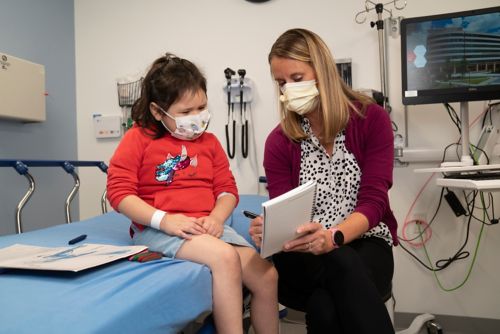St. Jude Family of Websites
Explore our cutting edge research, world-class patient care, career opportunities and more.
St. Jude Children's Research Hospital Home

- Fundraising
Blood Disorders Treatment
Our world-class hematology program studies and treats blood disorders in children.

St. Jude Children’s Research Hospital offers patient families top-tier hematology treatment programs. Since the first day we opened in 1962, St. Jude doctors and researchers have worked side-by-side. Their goals are to develop and improve therapies to treat and cure children with non-cancerous blood disorders.
Why St. Jude for blood disorders treatment?
Our experienced hematology medical team works alongside renowned scientists to treat children who have blood disorders and to research better treatments and cures. A full team of experts and specialists is dedicated to each child.

St. Jude is not like any other children’s hospital:
- We have one of the largest treatment programs in the country for children with sickle cell disease.
- In 1983, a St. Jude patient was the first in the world to be cured of sickle cell disease through a stem cell (bone marrow) transplant.
- St. Jude is 1 of only 141 federally funded Hemophilia Treatment Centers in the United States.
- Our hematology program works with the patient’s hometown doctors to arrange lifelong monitoring and disease follow-up for patients with certain blood disorders. Families also receive thorough follow-up care.
- St. Jude offers genetic counseling for children with certain blood disorders.
- Children with blood disorders benefit from comprehensive, state-of-the-art care. This includes stem cell (bone marrow) transplants if needed and access to promising new treatments.
- St. Jude has several labs performing research to find cures for blood disorders, including pioneering gene therapy research.
- St. Jude also develops collaborative research partnerships with the National Institutes of Health and other institutions throughout the world.
- The nurse-to-patient ratio at St. Jude is unmatched — averaging 1 nurse for every 3 patients in hematology and oncology, and 1:1 in the Intensive Care Unit.
More reasons to choose St. Jude for care include:
- At St. Jude, we have created an environment where children can be children and families can be together.
- St. Jude patients and families never pay for services authorized by St. Jude.
- The nurse-to-patient ratio at St. Jude is unmatched — averaging 1 nurse for every 3 patients in hematology and oncology, and 1:1 in the Intensive Care Unit.
- Scientists at St. Jude have studied sickle cell disease since the hospital first opened in 1962. The first research grant awarded to St. Jude was to study sickle cell disease.
“I tell people all the time that I am a walking miracle.”
Blood disorders we treat
Children with blood diseases often face lifelong health challenges. St. Jude offers these children exceptional care. We also give your family the support you need to address the physical, emotional, psychological, and educational challenges of managing your child’s blood disorder.
The St. Jude team also manages patients with:
- Congenital hemolytic anemias
- Hemoglobinopathies – Hb C disease
- Hereditary elliptocytosis
- Hereditary spherocytosis
- Inherited macrothrombocytopenia (MYH9 RD)
- Pyruvate kinase deficiency
- Unstable hemoglobin disorders
- And many other disorders
Blood disorders clinical trials
Blood disorders treatment process
The St. Jude hematology program provides expert care and treatment for children with blood disorders. We also ensure that you have the compassionate support you need as your family adjusts to life with a blood disorder.
Learn more about the blood disorders treatment process at St. Jude.
Call: 1-888-226-4343 (toll-free) or 901-595-4055 (local) | Fax: 901-595-4011 | Email: referralinfo@stjude.org | 24-hour pager: 1-800-349-4334